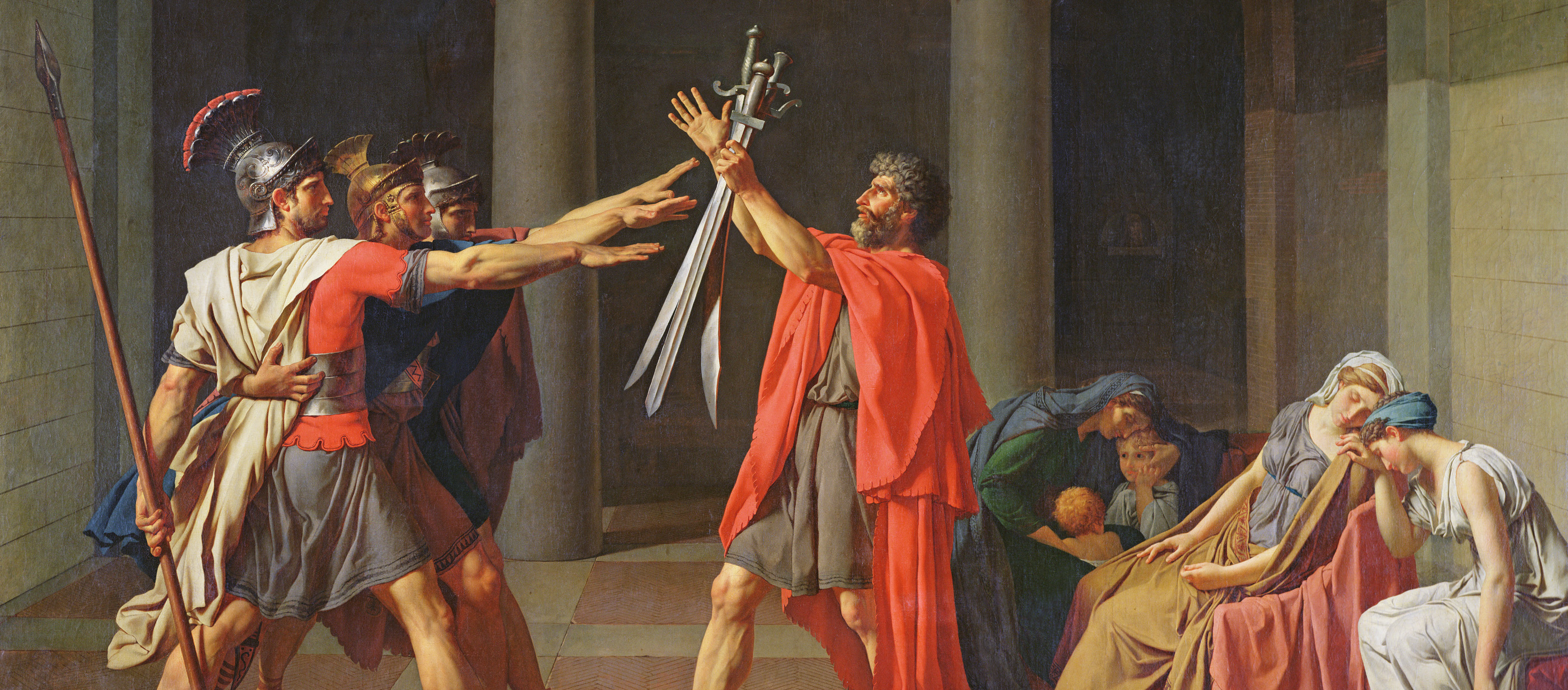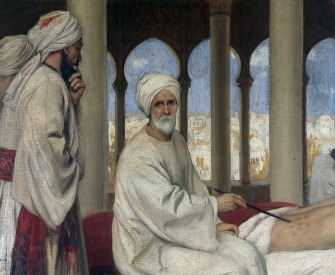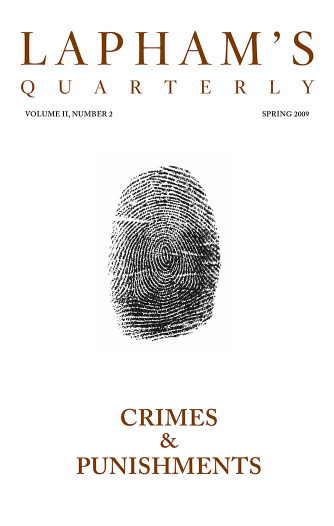All civilization has from time to time become a thin crust over a volcano of revolution.
—Havelock Ellis, 1921All Things Renew
Ralph Waldo Emerson on the transience of all things.
There are no fixtures in nature. The universe is fluid and volatile. Permanence is but a word of degrees. Our globe seen by God is a transparent law, not a mass of facts. The law dissolves the fact and holds it fluid. Our culture is the predominance of an idea which draws after it this train of cities and institutions. Let us rise into another idea: they will disappear.
The Greek sculpture is all melted away, as if it had been statues of ice; here and there a solitary figure or fragment remaining as we see flecks and scraps of snow left in cold dells and mountain clefts in June and July. For the genius that created it creates now somewhat else. The Greek letters last a little longer but are already passing under the same sentence and tumbling into the inevitable pit which the creation of new thought opens for all that is old. The new continents are built out of the ruins of an old planet; the new races fed out of the decomposition of the foregoing. New arts destroy the old. See the investment of capital in aqueducts made useless by hydraulics; fortifications, by gunpowder; roads and canals, by railways; sails, by steam; steam, by electricity.
You admire this tower of granite, weathering the hurts of so many ages. Yet a little waving hand built this huge wall, and that which builds is better than that which is built. The hand that built can topple it down much faster. Better than the hand, and nimbler, was the invisible thought which wrought through it, and thus ever behind the coarse effect is a fine cause which, being narrowly seen, is itself the effect of a finer cause. Everything looks permanent until its secret is known.
The life of man is a self-evolving circle which, from a ring imperceptibly small, rushes on all sides outward to new and larger circles, and that without end. The extent to which this generation of circles, wheel without wheel, will go depends on the force or truth of the individual soul. For it is the inert effect of each thought, having formed itself into a circular wave of circumstance—as, for instance, an empire, rules of an art, a local usage, a religious rite—to heap itself on that ridge, and to solidify and hem in the life. But if the soul is quick and strong, it bursts over that boundary on all sides and expands another orbit on the great deep, which also runs up into a high wave, with attempt again to stop and to bind. But the heart refuses to be imprisoned; in its first and narrowest pulses it already tends outward with a vast force and to immense and innumerable expansions.
Step by step we scale this mysterious ladder—the steps are actions; the new prospect is power. Every several result is threatened and judged by that which follows. Every one seems to be contradicted by the new; it is only limited by the new. The new statement is always hated by the old and, to those dwelling in the old, comes like an abyss of skepticism. But the eye soon gets wonted to it, for the eye and it are effects of one cause: then its innocency and benefit appear, and presently, all its energy spent, it pales and dwindles before the revelation of the new hour.
There are no fixtures to men if we appeal to consciousness. Every man supposes himself not to be fully understood—and if there is any truth in him, if he rests at last on the divine soul, I see not how it can be otherwise. The last chamber, the last closet, he must feel, was never opened; there is always an unknown residue, unanalyzable. That is, every man believes that he has a greater possibility.
Men cease to interest us when we find their limitations. The only sin is limitation. As soon as you once come up with a man’s limitations it is all over with him. Has he talents? Has he enterprise? Has he knowledge? It boots not. Infinitely alluring and attractive was he to you yesterday, a great hope, a sea to swim in; now you have found his shores, found it a pond, and you care not if you never see it again.
Beware when the great God lets loose a thinker on this planet. Then all things are at risk. It is as when a conflagration has broken out in a great city and no man knows what is safe, or where it will end. There is not a piece of science but its flank may be turned tomorrow; there is not any literary reputation, not the so-called eternal names of fame, that may not be revised and condemned. The very hopes of man, the thoughts of his heart, the religion of nations, the manners and morals of mankind, are all at the mercy of a new generalization. Generalization is always a new influx of the divinity into the mind. Hence the thrill that attends it.
In common hours society sits cold and statuesque. We all stand waiting, empty—knowing, possibly, that we can be full, surrounded by mighty symbols which are not symbols to us but prose and trivial toys. Then cometh the god, and converts the statues into fiery men, and by a flash of his eye burns up the veil which shrouded all things, and the meaning of the very furniture, of cup and saucer, of chair and clock and tester, is manifest. The facts which loomed so large in the fogs of yesterday—property, climate, breeding, personal beauty, and the like—have strangely changed their proportions. All that we reckoned settled shakes and rattles, and literatures, cities, climates, religions leave their foundations and dance before our eyes.

The Oath of the Horatii, by Jacques-Louis David, 1784. Louvre, Paris, France.
Thus there is no sleep, no pause, no preservation, but all things renew, germinate, and spring. Why should we import rags and relics into the new hour? Nature abhors the old, and old age seems the only disease; all others run into this one. We call it by many names—fever, intemperance, insanity, stupidity, and crime: they are all forms of old age; they are rest, conservatism, appropriation, inertia, not newness, not the way onward. We grizzle every day. I see no need of it. While we converse with what is above us, we do not grow old, but grow young. Infancy, youth, receptive, aspiring, with religious eye looking upward, counts itself nothing and abandons itself to the instruction flowing from all sides. But the man and woman of seventy assume to know all—they have outlived their hope, they renounce aspiration, accept the actual for the necessary, and talk down to the young. Let them then become organs of the Holy Ghost; let them be lovers; let them behold truth, and their eyes are uplifted, their wrinkles smoothed, they are perfumed again with hope and power. This old age ought not to creep on a human mind. In nature every moment is new; the past is always swallowed and forgotten; the coming only is sacred.

Ralph Waldo Emerson
From “Circles.” Descended from a long line of clergymen, Emerson resigned from his pastorate in 1832, stating in his farewell sermon that he no longer believed in celebrating Holy Communion. Four years later he published Nature, effectively beginning the Transcendentalist movement. In 1845 Emerson allowed Henry David Thoreau use of a plot of land he owned beside Walden Pond, and in 1855, when Walt Whitman sent him a copy of Leaves of Grass, Emerson replied, “I greet you at the beginning of a great career.”




